16 facts about gay Hollywood icon Rock Hudson as revealing new documentary hits digital platforms
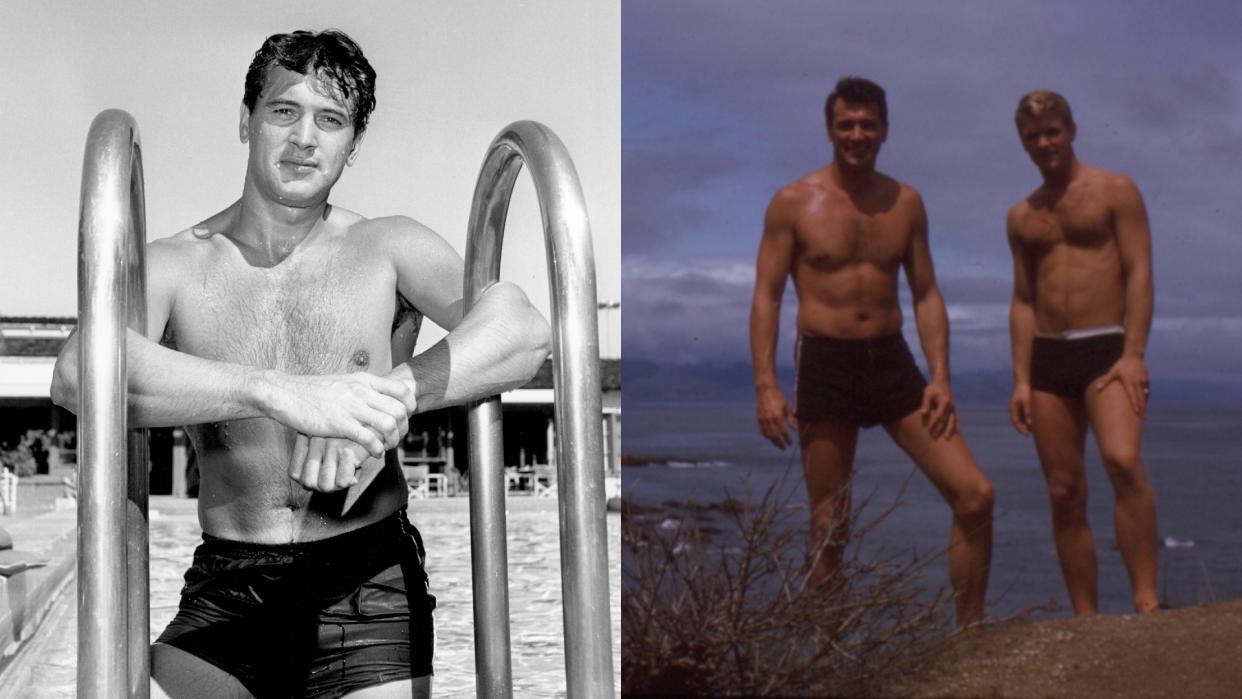
A great deal was written about Rock Hudson when he was alive. He was one of Hollywood’s favourite leading men, one of the first “beefcake” stars. But it’s safe to report that a lot more has been said about him since his death in October 1985.
The papers were full of stories when it was finally revealed that he didn’t die from heart disease or cancer, as the studios desperately wanted fans to believe – but from an Aids-related illness. And that he was gay.
His death, according to Friends and Falcon Crest actress Morgan Fairchild, even “gave Aids a face”.
Since then there have been biographies, more newspaper stories, wild – and sometimes true – rumours about him, as well as documentaries and dramas such as Ryan Murphy’s mini-series, Hollywood. The Emmy-Award-winning Netflix show starred Jake Picking as Rock and The Big Bang Theory’s Jim Parsons as his scummy first agent, and talent scout, Henry Willson.
Big Audio Dynamite even had a song linked to him on their debut album the same year he died, called Stone (instead of Rock) Thames (instead of Hudson river). Then, in 1990, there was a TV film about his sham marriage.
And this year, Kelly Clarkson’s Chemistry album has a track simply entitled Rock Hudson.
Now, as the latest documentary, Rock Hudson: All That Heaven Allowed, is set to hit UK TV screens, maybe you think that everything that can be said, has been said.
But here are just a few things that might have passed you by…
Rock Garden
Before finding fame on the big screen, Hudson had a short stint in the military, then worked as a lorry driver, a petrol-pump attendant and a cinema usher. He once said, had he not made it in Hollywood, he’d like to have been a gardener.
Rock Music
Rock learned to play the piano by ear as a child and had a large collection of rare records. He even recorded an album in 1970. However, he never had any acting training.
Rock of Ages
His first agent, Henry Willson lied about Rock’s birthday, saying he was born in 1923 (not 1925) to get him more-mature roles.
Between a Rock and a Hard Place
Willson, who was also gay, was a thoroughly unpleasant man and most of his clients – all young men – found themselves on his “casting couch”. Actor Tony Curtis is quoted as saying: “Everybody who went with him had to sexually express himself to Henry. I’m putting it nicely.”
According to Rock’s biographer, Mark Griffin, the gay actor Roddy McDowall was equally as blunt, saying: “[Willson] was like the slime that oozed out from under a rock you did not want to turn over.”
Others claimed he actually blackmailed a young Rock about some of his secrets.
Among Willson’s other clients were the bisexual star of Dallas and All My Children, Dack Rambo, and another gay “beefcake” Tab Hunter. When Confidential magazine threatened to out Hudson, Willson sacrificed Hunter, giving them secrets about him and another of his clients instead.
In All That Heaven Allows, Griffin reveals Rock’s reason for not changing agents. “I said to him: ‘Why don’t you fire the sonofabitch?’” Hudson’s boyfriend Lee Garlington recalled asking. “And he said: ‘I can’t fire him because he threatened to have one of his boys throw acid in my face if I ever fired him, and I knew he would do it’.”
Hudson finally did fire Willson in 1966.
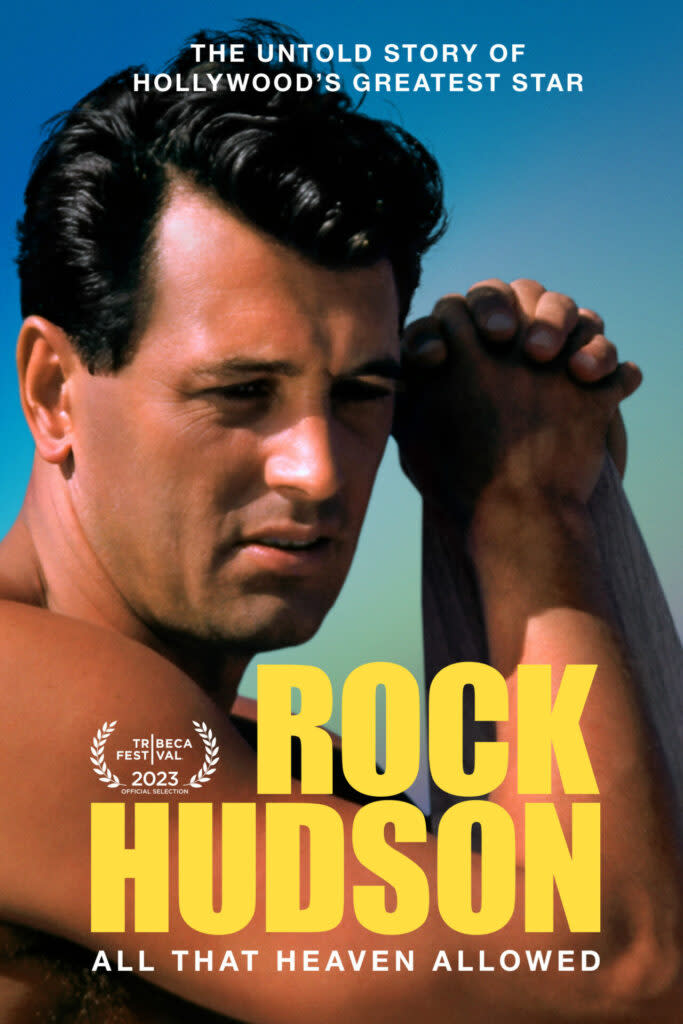
Making a Name For Himself
It was talent agent Willson who came up with the name ‘Rock Hudson’, by combining the Rock of Gibraltar and the Hudson River – a name the star is said to have hated. He disliked Universal Studios’ idea of ‘Roc’ even more. He was born Roy Harold Scherer Jr, later taking the name Roy Fitzgerald, when his mother – a telephone operator – remarried after his father, a car mechanic, walked out on the family. Rock didn’t like his physically abusive, alcoholic stepfather. He reportedly took toys away from young Roy that he believed were effeminate, and tried to squash the young man’s dreams of acting.
A Rock-y Start
Rock took five screen tests at different studios before signing with Universal. His screen test for Twentieth Century Fox was so bad, that the studio showed it to young actors for decades as an example of how, through hard work, however badly you can start out, you can still become a star.
His first role was in the 1948 war movie Fighter Squadron. It didn’t bode well – legend has it that his nerves got the better of him and it took 38 takes for him to get his only line correct! The problem cropped up again in 1954’s Magnificent Obsession – some scenes needed to be reshot up to 40 times. He would later praise his co-star Jane Wyman for being “so kind and patient.” Mind you, she must have been used to duff actors – she’d been married to Ronald Reagan! The future president and Hudson were close friends, as was Ronnie’s second wife Nancy.
Finding His Voice
Early in his career, in an effort to make his voice deeper, he has surgery on his vocal chords. A side effect meant he was unable to sing – a bit of a problem given he played King Arthur in a stage adaptation of the musical Camelot.
Rock ‘n’ Roles
He was so keen to appear in the 1957 adaptation of Ernest Hemingway’s A Farewell to Arms that he turned down roles in The Bridge on the River Kwai and the chance to play the lead role in Ben-Hur. Both those films were huge successes: Kwai made $30.6m and the Charlton Heston classic took almost $147m on its original release, as well as winning 11 Oscars. Arms, meanwhile, flopped horribly at the box office, grossing just $87,000 in its opening week. The critics weren’t any kinder, with Time Out New York branding it an “inflated remake”, while The New York Times said: “[It] is a tedious account of a love affair between two persons who are strangely insistent upon keeping it informal.” When, much later, it came out on DVD, Slant Magazine joked: “For those willing to endure [it]… don’t be a hero.”
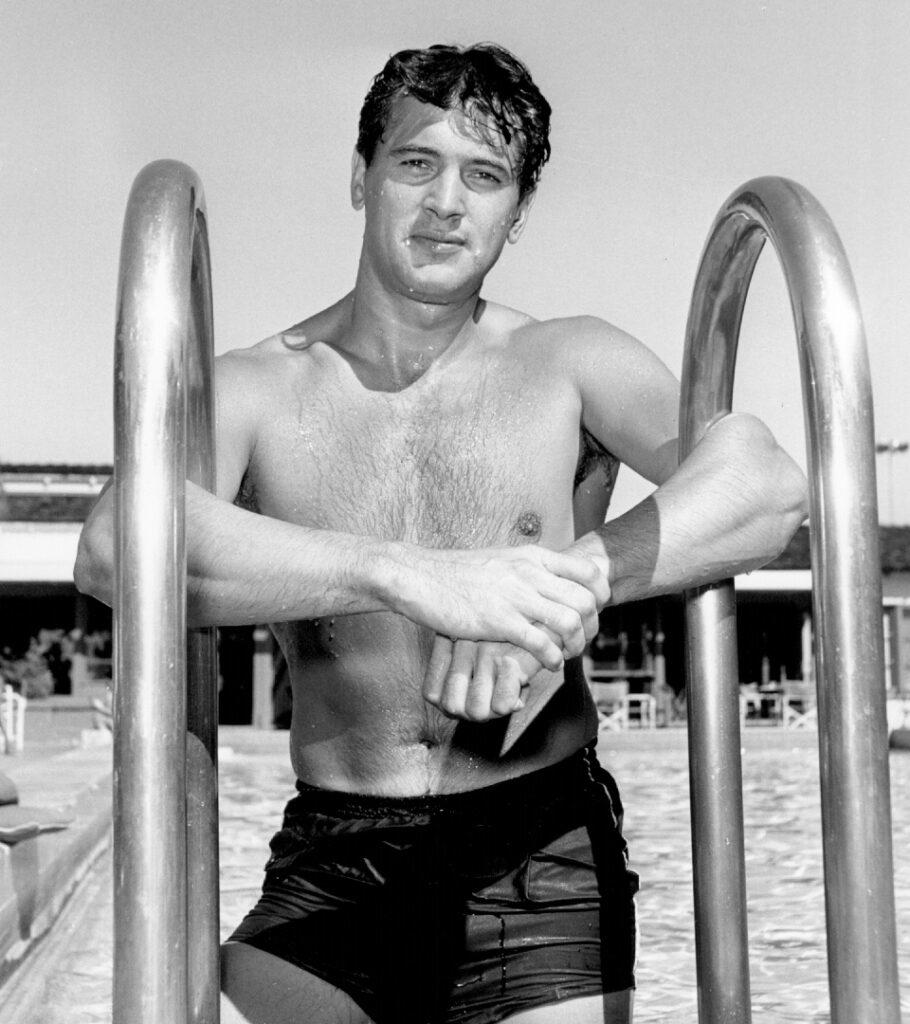
It’s Not Rock-et Science
Rock took up smoking at the age of 12. In November 1981 (around about his 56th birthday), after suffering chest pains, he underwent emergency quintuple heart-bypass surgery to relieve severely clogged coronary arteries. He started smoking again within days of leaving hospital. His ill-health meant he’d had to turn down the role of Colonel Sam Trautman in 1982’s First Blood – the film that introduced the world to John Rambo.
Rocking the Boat
According to Phyllis Gates, who was married to Hudson for three years, the star wept uncontrollably on hearing of the death of his Giant co-star – and gay icon – James Dean in a car crash in September 1955, at the age of just 24. That’s despite the fact that Dean is said to have treated Rock terribly on the set of the film, knowing his sexuality and disliking him for hiding it. He even accused Rock of coming on to him – some reports said he tackled him and French-kissed him.
For his part, Hudson was not a fan of Dean’s acting style. Later in life, Hudson admitted to disliking Dean intensely, even calling him a “prick”.
During breaks in filming, Rock and fellow Giant costar co-star Elizabeth Taylor are said to have created a new drink: chocolate martinis.
The marriage with Gates was, of course, a sham. Gates had been Henry Willson’s secretary. In 1958, shortly before their divorce, she demanded to know if Rock was gay. She hired a private detective to record the conversation, according to The Hollywood Reporter.
At one point, Rock’s wife says: “Everyone knows that you were picking up boys off the street shortly after we were married and have continued to do so, thinking that being married would cover up for you.” The actor denied the accusation.
But she also accused Rock, who was 32 at the time, of lasting longer in the bedroom with men than he did with her, to which he said: “Well, it’s a physical conjunction. Boys don’t fit. So, this is why it lasts longer.”
Party Piece
It said that he used to dress up as a ballerina for wild, late-night Hollywood parties. Stories of gay pool parties and non-stop sex abound to this day.
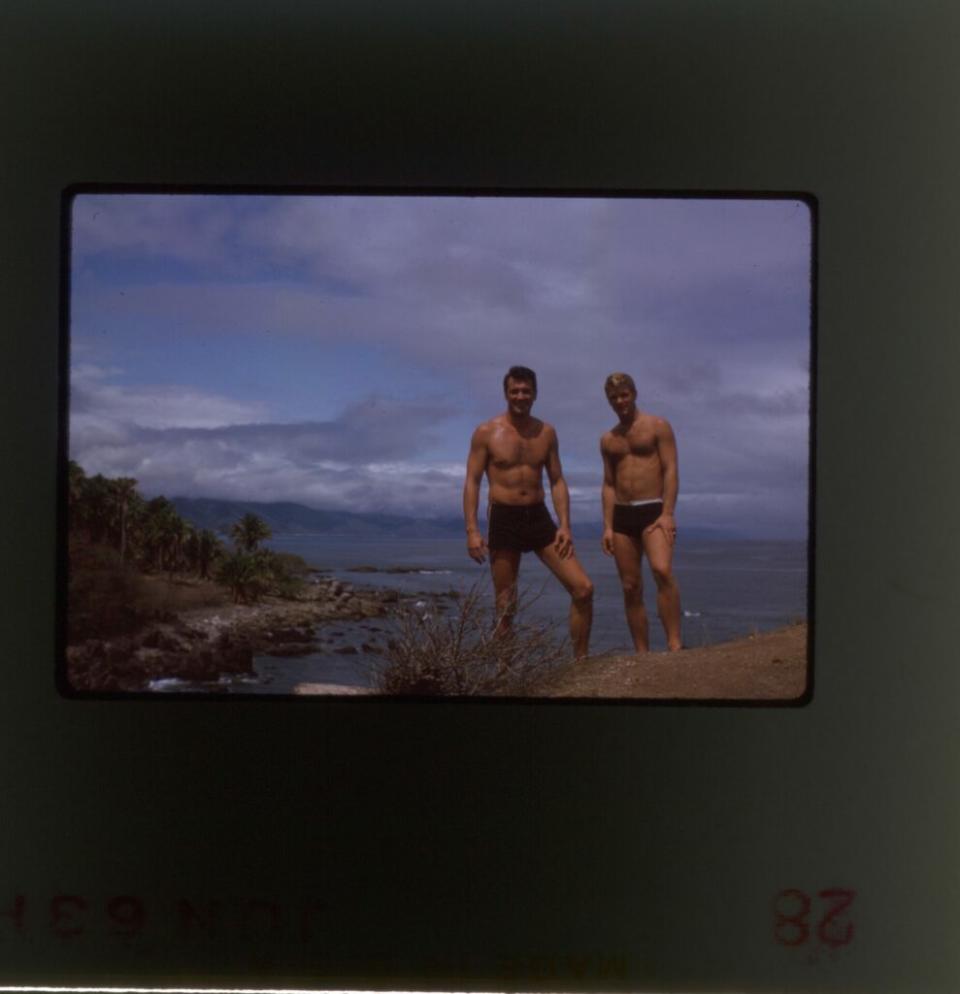
Getting His Rocks Off
According to some sources Rock also had relationships or “encounters” with comedian Jim Nabors, musician Liberace, and actors Anthony Perkins, Errol Flynn and Marlon Brando, among quite a few other lesser-known Hollywood names.
A Man of Few Words
He was described by virtually every journalist who spoke to him as the “worst interview in Hollywood.” He would say very little and give nothing away.
A Snapshot of His Life
As far as anyone knows, there has only been one photograph of Hudson with the man he described as “his one true love”, Lee Garlington. It was taken in a bar in New Orleans in the 1960s. “I remember how handsome he was and what a great time we had together,” Lee told People magazine in 2018. “He was the kindest man I ever met.”
Their secret once came close to being exposed. An over-enthusiastic fan broke into Rock’s home while he was away and slept in his bed. But she clearly didn’t spot the topless photo of Lee on a bedside table.
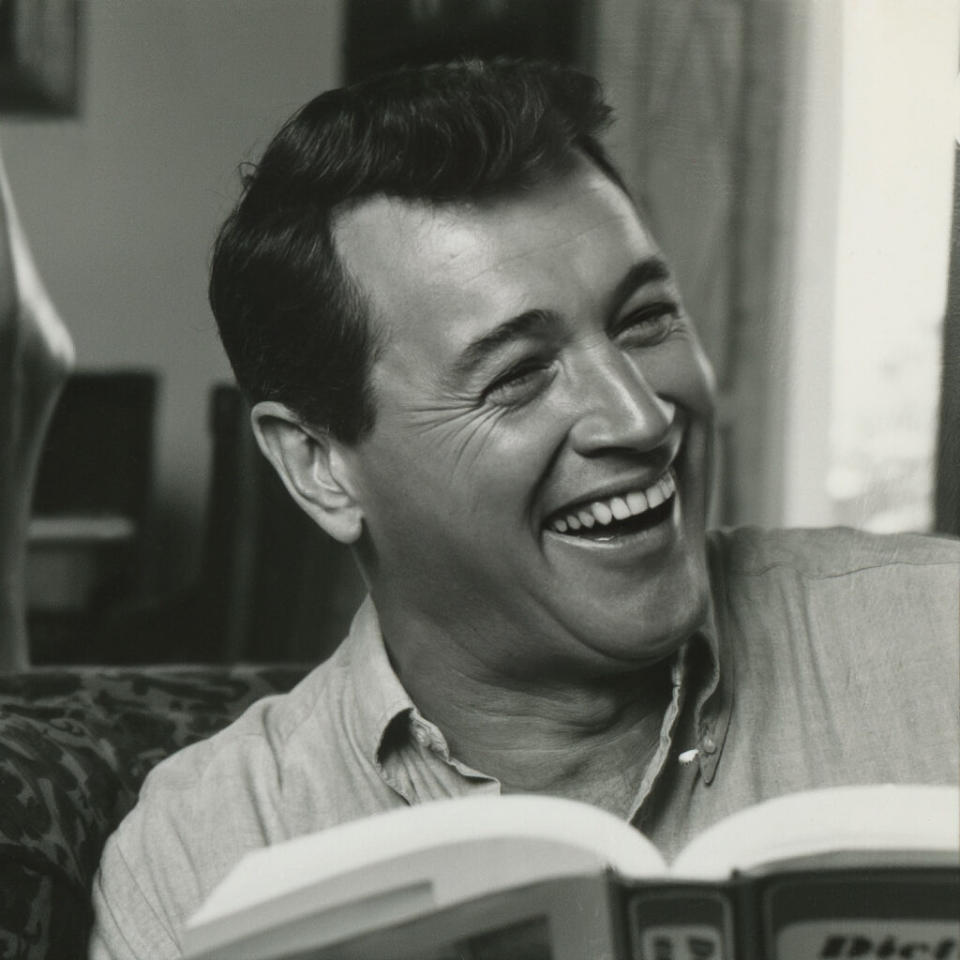
Support Network
While most people know of – or remember – the outrage that followed Hudson sharing an open-mouth kiss on the set of Dynasty with Linda Evans, when he already knew his HIV status, but not knowing back then that HIV/Aids can’t be transmitted that way, it’s a lesser-known fact that one young man who had slept with the star, on receiving an anonymous note – from Hudson – advising him to have a check-up, did find out that he had the condition.
After he revealed to the world that he had Aids, in July 1985, Rock received telegrams – the DMs of the time – of support from dozens of other celebrities, including Marlene Dietrich, Gregory Peck, Richard Dreyfuss, Frank Sinatra and Madonna. And that’s before the letters sent by 28,000 ardent fans. He also got a phone call from President Reagan.
Leaving His Marc
Despite describing Lee Garlington as his true love, Hudson left the bulk of his estate to fellow “beefcake” and openly gay actor George Nader and Nader’s lifelong partner Mark Miller, who was also Hudson’s personal secretary.
Another former boyfriend, Marc Christian, later sued the estate, claiming Rock had never revealed his HIV status while they were together. In 1989, he was awarded $21.75m after a jury said Hudson had displayed “outrageous conduct”. This was reduced to $5.5m by a court of appeal, which called it just compensation for the “ultimate in personal horror, the fear of slow, agonising death”. As we now know, HIV cannot be transmitted through kissing. Christian, who was with Rock in the 1980s, was portrayed by lawyers working for Hudson’s estate as a gold-digging hustler, and criticised by the gay community.
“It was obviously a ground-breaking case,” said Tammy Bruce, an openly gay conservative talk-show host. “It was the first public acknowledgment that gay relationships are complicated, important, and that responsibility is attached to them… A lot of people owe a great deal to that man and the way he handled it with particular grace, not only at the trial but in the years afterward.”
Ironically, in later years, Christian often found himself defending Hudson’s reputation against those who viewed the late actor’s conduct as reprehensible. “You can’t dismiss a man’s whole life with a single act. This thing about Aids was totally out of character for him,” Christian told People magazine.
He never developed the virus but died of heart problems at the age of 56. Nader died in 2002, aged 80. His partner, Miller, died in 2015, aged 88.
Rock Hudson: All that Heaven Allowed is available to download and rent on digital platforms from 23 October.
The post 16 facts about gay Hollywood icon Rock Hudson as revealing new documentary hits digital platforms appeared first on Attitude.


